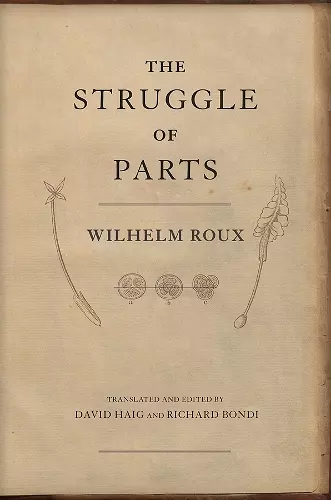The Struggle of Parts
Wilhelm Roux author David Haig editor Richard Bondi editor
Format:Hardback
Publisher:Harvard University Press
Published:28th Jun '24
Should be back in stock very soon

A landmark work of nineteenth-century developmental and evolutionary biology that takes the Darwinian struggle for existence into the organism itself.
Though he is remembered primarily as a pioneer of experimental embryology, Wilhelm Roux was also a groundbreaking evolutionary theorist. Years before his research on chicken and frog embryos cemented his legacy as an experimentalist, Roux endorsed the radical idea that a “struggle for existence” within organisms—between organs, tissues, cells, and even subcellular components—drives individual development.
Convinced that external competition between individuals is inadequate to explain the exquisite functionality of bodily parts, Roux aimed to uncover the mechanistic principles underlying self-organization. The Struggle of Parts was his attempt to provide such a theory. Combining elements of Darwinian selection and Lamarckian inheritance of acquired characteristics, the work advanced a materialist explanation of how “purposiveness” within the organism arises as the body’s components compete for space and nourishment. The result, according to Charles Darwin, was “the most important book on evolution which has appeared for some time.”
Translated into English for the first time by evolutionary biologist David Haig and Richard Bondi, The Struggle of Parts represents an important forgotten chapter in the history of developmental and evolutionary theory.
Thanks to Haig and Bondi, I now see why this work might have intrigued Darwin and how it provides valuable insight into late nineteenth-century ideas about evolution and development. They make clear what Roux was doing, why, and how it mattered then — and still does today. The excellent translation and thoughtful editing make the ideas not only accessible but also more coherent than they may have been to many contemporary readers…This is a notable achievement that we can applaud. -- Jane Maienschein * Current Biology *
This careful, elegant, scholarly translation of Roux’s The Struggle of Parts is fascinating. Roux’s insufficiently appreciated insights were more than one hundred years ahead of their time and are especially worth reading for anyone interested in the history of fundamental ideas in evolutionary biology, functional adaptation, levels of selection, and what we today call phenotypic plasticity and epigenetics. -- Daniel E. Lieberman, author of Exercised: Why Something We Never Evolved to Do Is Healthy and Rewarding
This translation is an important and scholarly contribution to the history and philosophy of biology. The excellent introduction and afterword introduce the rich scientific context in which Roux developed his broad concept of selection as differential persistence and point to the relevance of his ideas to current, and still debated, ideas in evolutionary biology. -- Eva Jablonka, Professor Emerita in History and Philosophy of Science, Tel Aviv University
This translation is to be greatly welcomed. Roux was a pioneer in experimental embryology who sought to do what Kant held to be impossible: to explain the purposiveness of organisms with the aid of mechanical principles. These efforts also inspired Nietzsche in his thinking about life and wrestling with Darwinian ideas. The edition is superb and can be recommended to anyone with an interest in the study of life. -- Keith Ansell-Pearson, Honorary President, Friedrich Nietzsche Society
David Haig and Richard Bondi have done a great service to a number of fields. By translating Roux’s The Struggle of Parts, they have made widely available crucial ideas by a profound thinker. Roux’s discussion of how cooperation, competition, and mutual control underlie the formation of a coherent body and mind has major implications for evolutionary and developmental biology, cognitive science, bioengineering, and even artificial intelligence. -- Michael Levin, Professor of Biology, Tufts University
ISBN: 9780674290648
Dimensions: 235mm x 156mm x 19mm
Weight: 515g
288 pages